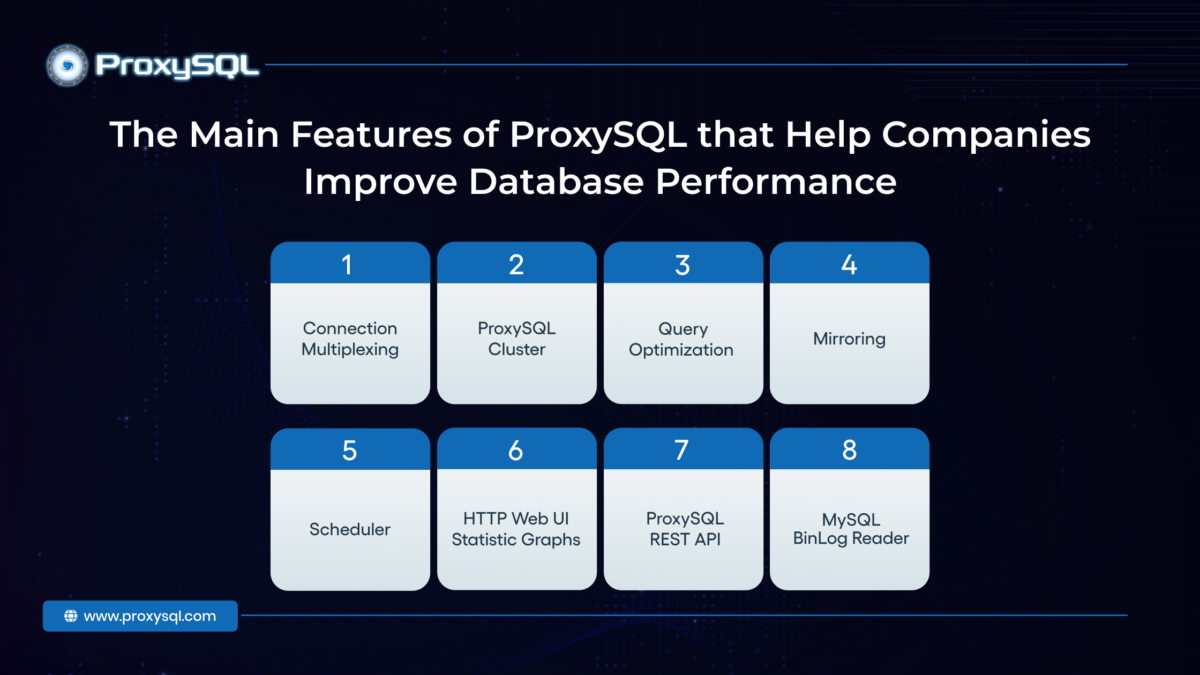ProxySQL helps you squeeze the last drop of performance out of your MySQL or PostgreSQL clusters with advanced connection management and flexible routing to scale across thousands of servers. It support for various replication topology: Galera , Group Replication, Aurora.
The Open Source project was started in 2013 and the company was founded in 2014. The company was established to meet the needs of a growing user base and provide dedicated support.
Why?
The mission is solving MySQL scalability challenges:
- Connection management to control database overload
- Backend load reduction for optimized performance.
- Traffic control to block unwanted queries.
- Query routing and rewriting for precision and flexibility.
- Query caching to enhance efficiency.
ProxySQL is built to solve these challenges:
- Dynamic Sharding and Query Routing: enables intelligent query routing to specific shards or replicas and allows businesses to scale horizontally without significant application changes.
- Massive Connection Multiplexing: efficiently manages up to 1 million concurrent client connections, consolidates connections into optimized backend queries, reducing MySQL and PostgreSQL load.
- Support for Large-Scale Deployments: handles thousands of servers in multi-region or multi-cloud architectures and provides seamless traffic distribution and failover across nodes.

For more information see: How Companies Improve Database Performance with ProxySQL
Installation
ProxySQL has a broad compatibility:
- Supports MySQL, MariaDB, Percona Server, and popular clustering solutions.
- Supports PostgreSQL (in beta)
- Support solutions based on MySQL or PostgreSQL protocol
- Works in multiple environments, from single instances to global multi-cloud deployments
You can install the packages directly by first downloading from the Github Releases Page or use the RPM / DEB repositories to install from the official ProxySQL repositories.
ProxySQL packaged releases are available for the following operating system distributions:

- RedHat & CentOS 7, 8, 9
- Amazon Linux 2, 2023
- Debian 10, 11, 12
- Ubuntu 16, 18, 20, 22, 24
- Almalinux 8, 9
- OpenSUSE Leap 15
If you are looking to run ProxySQL in Docker please check out the DockerHub repository for ProxySQL and more specifically if you are interested in running ProxySQL on Kubernetes you can find sample Helm charts in the ProxySQL Kubernetes repository (these can be exported to an operator if you are keen building your own).
Product roadmap
- Automated Scaling and Recovery
● Features for zero-downtime scaling in multi-cloud and hybrid setups.
● Enhanced failover mechanisms with real-time replication checks. - Proactive Performance Management
● Advanced observability tools for tracking database performance metrics.
● Predictive scaling based on historical traffic patterns. - Security Advancements
● New compliance features to meet evolving data protection regulations.
● Expanded auditing, firewall, and data obfuscation capabilities.











